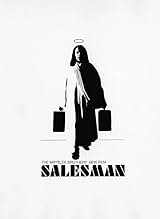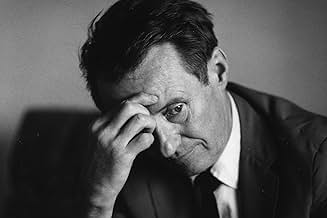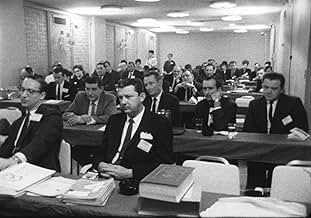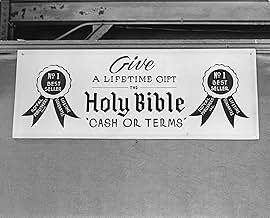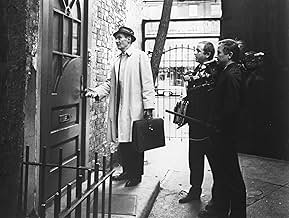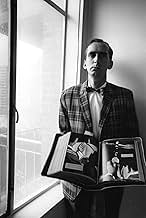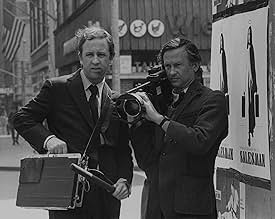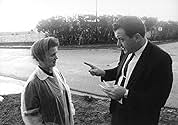Four dogged door-to-door Bible salesmen travel from Boston to Florida on a seemingly futile quest to sell luxury editions of the Good Book to working-class Catholics.Four dogged door-to-door Bible salesmen travel from Boston to Florida on a seemingly futile quest to sell luxury editions of the Good Book to working-class Catholics.Four dogged door-to-door Bible salesmen travel from Boston to Florida on a seemingly futile quest to sell luxury editions of the Good Book to working-class Catholics.
- Awards
- 4 wins total
Featured reviews
A 1969 documentary about a group of salesman selling bibles to the masses. It's probably most interesting because you see how people lived and worked 40 years ago. The salesmen themselves are interesting but so are the people they meet. Of course they use every trick in their book to sell their bibles ("Did I tell you I'm an Irish catholic?"). Very interesting to see how these men worked in a job which is now very much gone. Alone on the road they share their misery and failings with their fellow salesmen who yawn and offer some half-hearted advice.
Salesman is a real version Glengary Glen Ross 25 years before that movie was made. What we have here is a time capsule of 1969. The decorations in the homes, the clothing, the cars, the way they talk, it's all pretty dated by today's standards. But it's interesting to see how people lived in 1969.
Salesman is a real version Glengary Glen Ross 25 years before that movie was made. What we have here is a time capsule of 1969. The decorations in the homes, the clothing, the cars, the way they talk, it's all pretty dated by today's standards. But it's interesting to see how people lived in 1969.
The camera follows four Bible salesmen as they follow up on names of Catholic parishioners in Boston and then Florida.
I can understand that the documentary is not for all tastes. There's really no narrative, while we know next to nothing about the four principals. Yet, the results, to me at least, are fascinating, if not entertaining. The four Bible salesmen are a harried crew, near the bottom of a commercial food chain. Pressure to sell goes from ownership to management to salesmen, and finally to prospective customers to buy. And throughout, the camera never wavers, at times lingering over a face in rather enigmatic fashion. Nor do the subjects ever acknowledge camera's presence-- quite a cinematic accomplishment. Importantly, these are ordinary faces, certainly not the Hollywood variety.
To me, the most interesting part are the working class customers. They can barely pay the bills they already have, let alone fork over an extra dollar a week. I'm guessing Badger's burnout comes from years of hustling people who should not be hustled. Of course, the pitch revolves around having a Bible with illustrations that will confirm a Catholic's faith and enrich their lives. I'm supposing the salesmen have to believe that at some level, otherwise how could they continue to pressure poor people to buy. And catch the ride by the ritzy Miami Beach hotels, right before the guys start knocking on wear-worn doors.
Overall, this is quite a remarkable 85-minutes, like nothing else I've seen. I'm not sure what to make of the result, that is, whether there's an intended point beyond the momentary. But either way, the unvarnished glimpses the film provides are definitely memorable.
I can understand that the documentary is not for all tastes. There's really no narrative, while we know next to nothing about the four principals. Yet, the results, to me at least, are fascinating, if not entertaining. The four Bible salesmen are a harried crew, near the bottom of a commercial food chain. Pressure to sell goes from ownership to management to salesmen, and finally to prospective customers to buy. And throughout, the camera never wavers, at times lingering over a face in rather enigmatic fashion. Nor do the subjects ever acknowledge camera's presence-- quite a cinematic accomplishment. Importantly, these are ordinary faces, certainly not the Hollywood variety.
To me, the most interesting part are the working class customers. They can barely pay the bills they already have, let alone fork over an extra dollar a week. I'm guessing Badger's burnout comes from years of hustling people who should not be hustled. Of course, the pitch revolves around having a Bible with illustrations that will confirm a Catholic's faith and enrich their lives. I'm supposing the salesmen have to believe that at some level, otherwise how could they continue to pressure poor people to buy. And catch the ride by the ritzy Miami Beach hotels, right before the guys start knocking on wear-worn doors.
Overall, this is quite a remarkable 85-minutes, like nothing else I've seen. I'm not sure what to make of the result, that is, whether there's an intended point beyond the momentary. But either way, the unvarnished glimpses the film provides are definitely memorable.
"Salesman" isn't quite the Maysles Bros.' (and Charlotte Zwerin's) crowning achievement, although it comes close. I personally feel that "Gimme Shelter" is their best film, but that might have something to do with it being a more enjoyable, if still harrowing film. "Salesman" is an uncomfortable examination of human emotions, and provokes a strong reaction of guilt and sympathy. Some may insist that a documentary has to be somewhat relevant to have any real value, but "Salesman", a film on the lives of door-to-door salesmen, the product of a mostly by-gone era, is pure contradiction of this claim.
A landmark 'cinema verite' film, "Salesman" does not feature any sort of narration or writing, allowing the viewer to take the images presented in the film and interpret them as they wish. There are statements that the Maysles Bros. are probably trying to make with this film, statements about suburbia, statements about the ties between business and organized religion, and more, but the beauty of the film is that it is up to you if you see this in the film or not, because really it is simply a document of an average day for a salesman at the time.
"Salesman" is funny in parts, but taken as a whole it is one of the saddest films you will ever see, a document of the quiet desperation of this lifestyle. The directors of the film make powerful statements, but do so subtly, almost unobtrusively, allowing the viewer to fully engage themselves in the almost routine feel of the film. It is a crime that, despite its strong reputation, relatively few people have seen this essential film from possibly the very best documentary filmmakers there have ever been.
10/10
A landmark 'cinema verite' film, "Salesman" does not feature any sort of narration or writing, allowing the viewer to take the images presented in the film and interpret them as they wish. There are statements that the Maysles Bros. are probably trying to make with this film, statements about suburbia, statements about the ties between business and organized religion, and more, but the beauty of the film is that it is up to you if you see this in the film or not, because really it is simply a document of an average day for a salesman at the time.
"Salesman" is funny in parts, but taken as a whole it is one of the saddest films you will ever see, a document of the quiet desperation of this lifestyle. The directors of the film make powerful statements, but do so subtly, almost unobtrusively, allowing the viewer to fully engage themselves in the almost routine feel of the film. It is a crime that, despite its strong reputation, relatively few people have seen this essential film from possibly the very best documentary filmmakers there have ever been.
10/10
This film is about the trials and tribulations of four door-to-door Bible salesmen in 1968, on the eve of when their occupation was about to become extinct. Of course, the filmmakers could not know that at the time, but this fact is what adds to the sadness of this film today. The salesmen are four New Englanders named Paul "The Badger" Brennan, James "The Rabbit" Baker, "The Bull" and "The Gipper", their nicknames being derived from their individual sales tactics. Despite the holiness of their products, this really is a cutthroat business, as is made evident in some of the sales meetings that are shown. The main character, "The Badger", reminds me of Jack Lemmon's character in Glengarry Glen Ross. Life - and his profession - have beaten him down, and none of his sales pitches are working as he talks to one indifferent potential customer after another. These guys are always looking for a new angle to make the sale, but usually just about everything they come up with is not successful. Remember, this was in the days when people were unafraid to open their doors to strangers, and equally unafraid to be rude to them. The film not only makes you feel what these unsuccessful salesmen are feeling, it a time capsule for the end of the '60s, and a portrait of an occupation that doesn't really exist anymore due to telemarketing, Internet sales, two-income families meaning nobody is home during the day, and finally the fact that adult strangers on your doorstep are assumed to be potential criminals.
Paul Brennan really seems to have the saddest story of the four. His sales are dwindling, and he is really too old to start over in another occupation. Paul's sales become so poor that at one point that he is partnered with a more aggressive salesman so Paul can observe his technique in the hope that something will rub off on Paul. This younger, sharper salesman, who obviously has not yet developed a tolerance for human frailty, is constantly snapping at Paul for his poor technique and unenthusiastic delivery. If you're an older person who has ever worked for a younger one, you know what I'm talking about. As sorry as you may feel for him though, when we see Paul using the possibly superstitious beliefs of his customers to get them to buy products they may not be able to afford, you have mixed feelings about the man. Is Paul purely being manipulative, or is he resorting to desperate means to survive? Probably a little bit of both is true. Paul realizes that his time as a salesman is coming to a close, and it's not like he has a big bank account to fall back on. Such career struggles are expected when you are in your 20's, but by the time you are Paul's age you are expecting something more...more job stability, more respect, more financial security.
The film does add some humor throughout the film to keep the viewing experience from being too much like a funeral for both Paul's career and the profession of door-to-door salesman itself. Sometimes the salesmen lighten up and even have some camaraderie in their conversations. Sometimes there is a funny remark from the "no sale" Boston housewives the salesmen encounter, and sometimes there are even funnier remarks from the salesmen as they leave a house where they've been refused. There's also an episode in a hotel pool in the middle of the night that is rather humorous.
I'd say that even though the film has a very dated look to it, you should watch it because what it has to say about the human spirit, aging ungracefully, choosing the wrong career, and then failing at that career is timeless.
Paul Brennan really seems to have the saddest story of the four. His sales are dwindling, and he is really too old to start over in another occupation. Paul's sales become so poor that at one point that he is partnered with a more aggressive salesman so Paul can observe his technique in the hope that something will rub off on Paul. This younger, sharper salesman, who obviously has not yet developed a tolerance for human frailty, is constantly snapping at Paul for his poor technique and unenthusiastic delivery. If you're an older person who has ever worked for a younger one, you know what I'm talking about. As sorry as you may feel for him though, when we see Paul using the possibly superstitious beliefs of his customers to get them to buy products they may not be able to afford, you have mixed feelings about the man. Is Paul purely being manipulative, or is he resorting to desperate means to survive? Probably a little bit of both is true. Paul realizes that his time as a salesman is coming to a close, and it's not like he has a big bank account to fall back on. Such career struggles are expected when you are in your 20's, but by the time you are Paul's age you are expecting something more...more job stability, more respect, more financial security.
The film does add some humor throughout the film to keep the viewing experience from being too much like a funeral for both Paul's career and the profession of door-to-door salesman itself. Sometimes the salesmen lighten up and even have some camaraderie in their conversations. Sometimes there is a funny remark from the "no sale" Boston housewives the salesmen encounter, and sometimes there are even funnier remarks from the salesmen as they leave a house where they've been refused. There's also an episode in a hotel pool in the middle of the night that is rather humorous.
I'd say that even though the film has a very dated look to it, you should watch it because what it has to say about the human spirit, aging ungracefully, choosing the wrong career, and then failing at that career is timeless.
Documentaries are a fairly pervasive genre in today's culture, and an increasing trend is to manipulate the footage in order to further the authentication of one's thesis. Albert and David Maysles' 1969 documentary 'Salesman' however, turns an unflinching eye on its' subjects, sometimes with unnerving and disturbing results.
'Salesman' follows four door-to-door high-end bible salesmen as they travel around the country. The four men have nicknames they've given each other, all describing their sales approach: The Rabbit, The Badger, The Gipper and The Bull. We hear most from The Badger (Paul Brennan) as he takes his leads and tries to pull himself out of a sales slump. The leads that most of the salesmen follow end up being poor Catholic families who can't even afford a dollar a week payment, but are at times talked into it anyway by the sales tactics these men employ.
The Maysles give us an absolutely fascinating look at the world of door-to-door sales, but it is also a disturbing door to open. The pressure that the salesmen use when trying to sell the product, and the struggle that the prospects exhibit, is difficult to watch. In one scene, Brennan goes to the door of a recent customer to pick up their down payment for another of the salesmen and pretty much refuses to take 'No' for an answer, telling her that he's the salesman's boss and is going to have to dock him a fee if she cancels the sale, eventually guilting this family who clearly cannot take on another installment payment into going on with the sale. On the other hand, we also see sales meetings where the pressure is turned on the salesmen themselves, so it's clear that the threats of unemployment are a definite motivator.
I wondered throughout the film if David Mamet had seen this film and subsequently used it as inspiration for 'Glengarry Glen Ross'. From the sales meeting where the manager threatens the salesmen to the characters themselves, I saw several clear comparisons. Brennan is Lemmon's 'Shel' character to a tee, and I subsequently couldn't help chuckling at the image of The Simpsons' character 'Gil'. Whatever specific inspiration 'Salesman' has provided, it is clearly an important film that does not soften its edges. 7/10
'Salesman' follows four door-to-door high-end bible salesmen as they travel around the country. The four men have nicknames they've given each other, all describing their sales approach: The Rabbit, The Badger, The Gipper and The Bull. We hear most from The Badger (Paul Brennan) as he takes his leads and tries to pull himself out of a sales slump. The leads that most of the salesmen follow end up being poor Catholic families who can't even afford a dollar a week payment, but are at times talked into it anyway by the sales tactics these men employ.
The Maysles give us an absolutely fascinating look at the world of door-to-door sales, but it is also a disturbing door to open. The pressure that the salesmen use when trying to sell the product, and the struggle that the prospects exhibit, is difficult to watch. In one scene, Brennan goes to the door of a recent customer to pick up their down payment for another of the salesmen and pretty much refuses to take 'No' for an answer, telling her that he's the salesman's boss and is going to have to dock him a fee if she cancels the sale, eventually guilting this family who clearly cannot take on another installment payment into going on with the sale. On the other hand, we also see sales meetings where the pressure is turned on the salesmen themselves, so it's clear that the threats of unemployment are a definite motivator.
I wondered throughout the film if David Mamet had seen this film and subsequently used it as inspiration for 'Glengarry Glen Ross'. From the sales meeting where the manager threatens the salesmen to the characters themselves, I saw several clear comparisons. Brennan is Lemmon's 'Shel' character to a tee, and I subsequently couldn't help chuckling at the image of The Simpsons' character 'Gil'. Whatever specific inspiration 'Salesman' has provided, it is clearly an important film that does not soften its edges. 7/10
Did you know
- Trivia49.95 U.S. Dollars (which is what the Bibles sold by the salesmen cost in 1965-66, the time of the movie) is the equivalent of about $500 in 2025.
- ConnectionsFeatured in Camera Three: Direct Cinema: Part 1 (1969)
- How long is Salesman?Powered by Alexa
Details
- Release date
- Country of origin
- Official sites
- Language
- Also known as
- The Maysles Brothers' Salesman
- Filming locations
- Auburn, Massachusetts, USA(The Yankee Drummer Inn)
- Production company
- See more company credits at IMDbPro
Box office
- Budget
- $105,000 (estimated)
- Runtime
- 1h 31m(91 min)
- Color
- Sound mix
- Aspect ratio
- 1.37 : 1
Contribute to this page
Suggest an edit or add missing content


